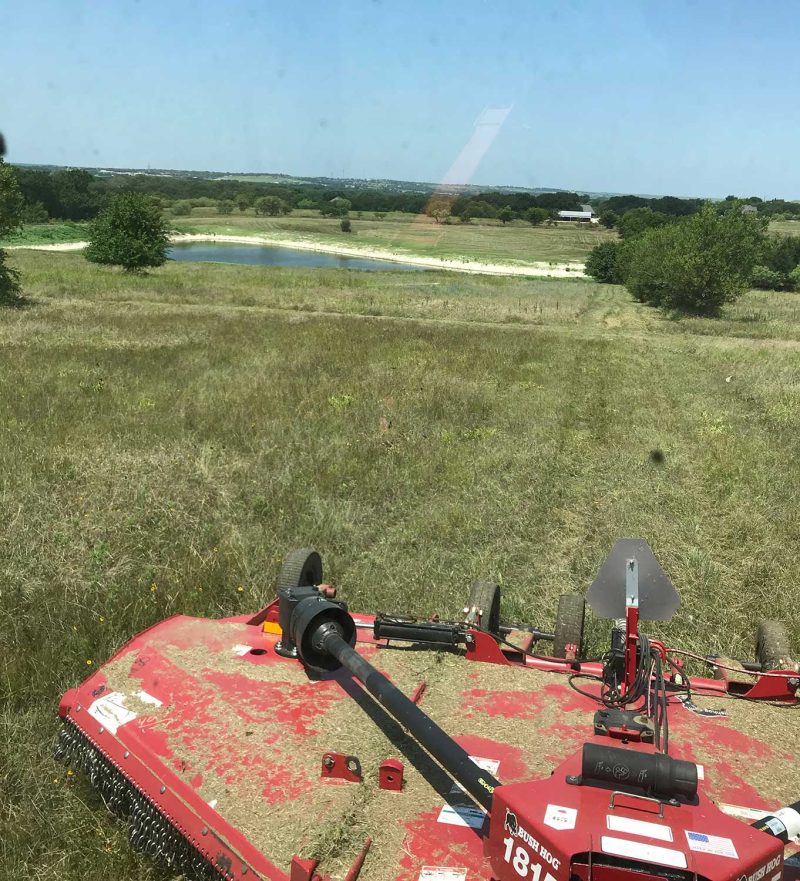
Field mowing during the winter months is every bit as important as field mowing during the spring and summer, and in this article, we will tell you why that is and what you need to do to foster strong growth in your grasses.
We are Keith’s Tractor Mowing, serving the Greater Fort Worth area with affordable acreage mowing, brush clearing, and land clearing. Call us today for a free job quote.
What is field mowing?
Field mowing generally refers to the mowing of an area one acre or larger with a field mower, and it is often used in conjunction with discussions about mowing farms and ranches, two locations which depend on healthy grasses/pastures/crops. Knowing the do’s and don’ts of proper field mowing can mean the savings of hundreds, if not thousands, of dollars at year’s end.
Why winter mowing is important?
Without proper mowing techniques, and a knowledge of when to mow, you will not have healthy grasses in the spring and summer, and on a ranch or farm, that could be very costly.
What to do.
If possible, keep horses off pastures during the winter. The grass is not growing, but they continue to nibble everything down to the ground. This damages perennial grass plants, which will take longer to recover in the spring. In addition, your horses’ hooves slice through the soil in wet conditions, damaging root systems and further slowing spring recovery.
A stress lot would be an ideal place to turn horses out during the winter, or designate one pasture as the “winter pasture,” knowing that it will need to be renovated and rested in the spring. If your stress lots get very muddy in the winter and spring, look into installing heavy-use pads, AKA stabilized stone pads or all-weather paddocks, which improve drainage dramatically.
Try to avoid spreading manure in the winter, especially if there is snow cover or the ground is frozen.
Fall considerations.
If you are not sure what kind of grasses you have in your pastures, look at the color when temperatures start getting cold. Desirable cool-season grasses like orchard grass, tall fescue, Kentucky bluegrass, and perennial ryegrass will be green and growing. Summer annual weed grasses like crabgrass, foxtail, barnyard grass, and Japanese stilt grass will be ending their life cycles and turning brown. If your pastures are mostly brown in late fall, you may want to consider reseeding with cool-season grasses.
If you do have a lot of summer annual grasses, mow when you see seed heads forming. The only way they regrow from year to year is through dropped seeds. Mowing before the seeds drop will reduce the number that grow back next year. Continue to catalog weeds. Some difficult perennial weeds like horse nettle and Canada thistle can’t always be controlled by mowing, and they will spread from year to year via the root system. Fall is the most effective time to spray many perennial weeds with herbicide because they are transferring energy reserves down into their roots, and plants will pull the herbicide into the roots with the energy reserves.
As temperatures cool off and grasses break summer dormancy, another application of nitrogen (N) will provide more forage growth during the fall green-up. Another 40-50 pounds of N around September is appropriate. Remember to let some rain wash the fertilizer off the grass before returning horses to pasture.
A final word about Keith’s Tractor Mowing
Keith’s Tractor Mowing is locally owned and operated, a trusted name in the Greater Fort Worth area. Any mowing job over one acre in size, be it ranch mowing, pipeline mowing, cemetery mowing, football fields, you name it and we’ve done it. Call us today for tractor mowing services at its best